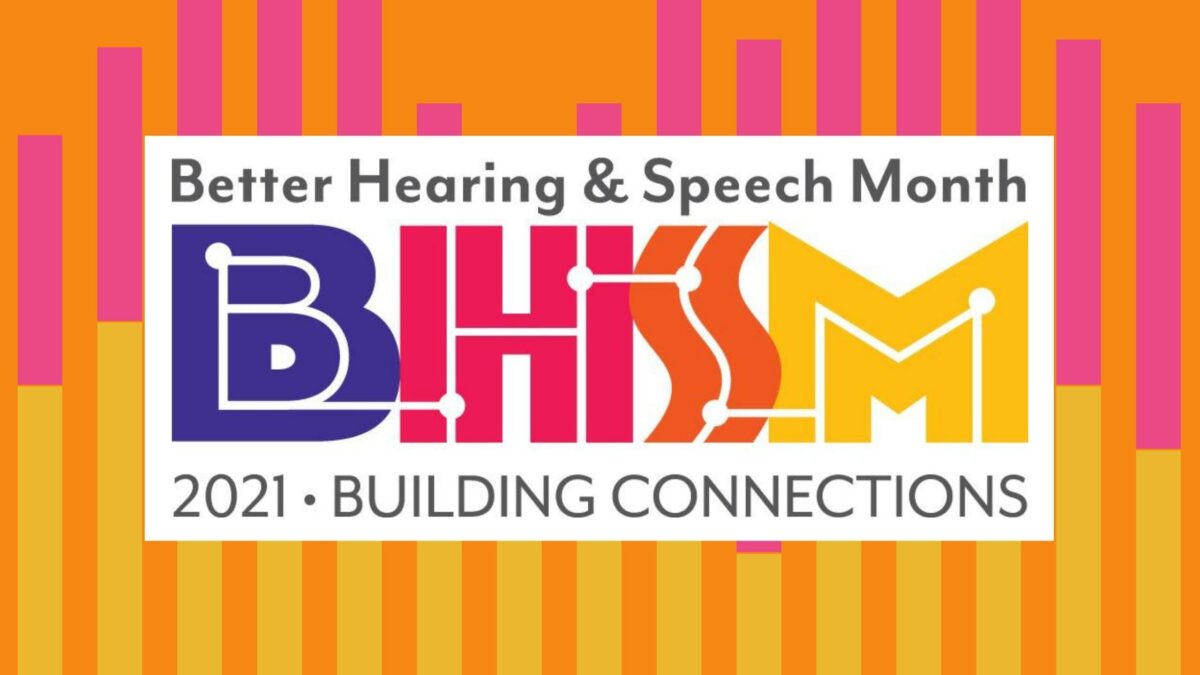For hearing experts across the US, this month might be the most critical time of the year. It’s Better Hearing and Speech Month (BHSM) which means the American Speech-Language-Hearing Association (ASHA) is amping up its efforts to raise awareness about communication disorders, hearing safety, and the importance of early intervention. ASHA’s BSHM theme this year is ‘Building Connections’, something which acquires particular importance considering how little we have been able to connect with others this year.
Socializing and connecting with other people daily not only makes our lives more enjoyable, but this contact is also essential to keeping our brains healthy. When untreated hearing loss interferes with the ability to communicate with others, especially in older people, the mind suffers.
Read on for more information about the goals of Better Hearing and Speech Month and why treating hearing loss is vital for healthy cognitive function.
The goals of Better Hearing and Speech Month
ASHA is focusing its efforts on a multifaceted public education campaign. The primary message is the importance of human communication and safe listening, especially when using popular modern devices such as smartphones and tablets.
With several outreach tactics and resources, ASHA will educate the public about the crucial need for early treatment of hearing loss by speech-language pathologists and audiologists.
How does hearing loss affect cognitive health?
Researchers are learning more every day about the health risks of untreated hearing loss. One of the most compelling may be the effect it has on brain health.
Hearing loss is strongly associated with aging, and it is not as harmless as once thought. Scientific research suggests that hearing plays a crucial role in maintaining brain health. If left untreated, hearing loss can result in diminished cognitive function and even increase the risk of diseases like Alzheimer’s and dementia. Studies show that compared with older adults with normal hearing, those with untreated hearing loss are up to five times more likely to develop debilitating cognitive disorders. The good news is that treating hearing loss with hearing aids may improve cognitive function and help to delay dementia.
So why does hearing loss have this adverse effect on the brain? Though there is not a definitive answer yet, several theories have been put forward in the field of audiological research. It has been suggested that a common pathology may underlie both conditions or that the strenuous task of decoding sounds over time may overwhelm the brains of people with hearing loss, leaving them more vulnerable to dementia. There is also speculation that hearing loss could cause dementia by making individuals more socially isolated, which increases the risk of dementia and other cognitive disorders.
Treating hearing loss improves brain health.
Although the vital link between hearing loss and dementia is worrying, a recent French study offers some hope. In the study, 94 people between the ages of 65 and 85 with profound deafness in at least one ear were given cochlear implants, along with twice-weekly auditory therapy. The results were promising: over 80 percent of those with the lowest cognitive scores showed significant improvement one year after receiving the implant. This important finding may lead to increased intervention in hearing loss and reduce the rates of Alzheimer’s and dementia in senior citizens.
Another study from last year by researchers from the University of Melbourne, Australia, found that wearing hearing aids can help older adults postpone cognitive loss and improve brain function. During the study, hearing aids were provided to 100 hearing-impaired individuals between the ages of 62 and 82. After being fitted with hearing aids for 18 months, participants showed a substantial improvement in their speech recognition capacity and a vast improvement in their quality of life.
Take steps to correct your hearing today!
We offer a full range of diagnostic and treatment services and the best hearing products on the market today. We provide diagnostic hearing evaluations to determine the cause and severity of your hearing loss. We will work with you to develop a treatment plan that is suited to your needs.
If you are experiencing trouble with your hearing, we can help. Come in for a consultation during Better Hearing and Speech Month!

